Tag: Great Lent
Zacchaeus Sunday
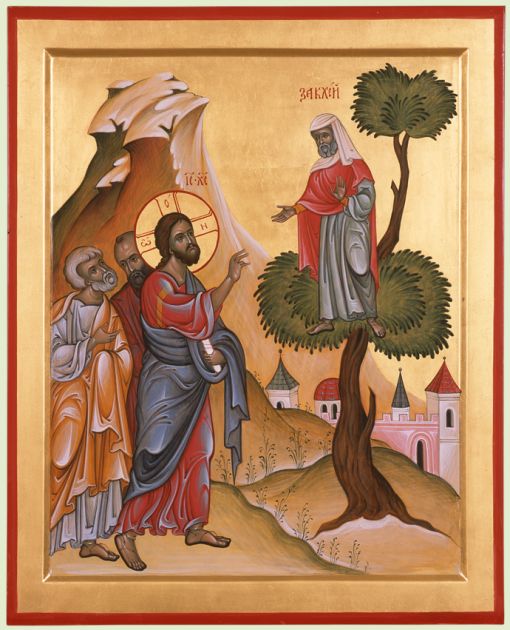 Today is Zacchaeus Sunday! (Lk 19:1-10)
Today is Zacchaeus Sunday! (Lk 19:1-10)Presanctified Liturgy TONIGHT
Today, Friday, March 29, at 7:00 p.m. Father Iura will serve the Divine Liturgy of the Presanctified Gifts, in English and Ukrainian.
This is our weekly Lenten devotion. Join us in prayer and the reception of the Eucharist. Bring a friend.
The Feast of the Annunciation
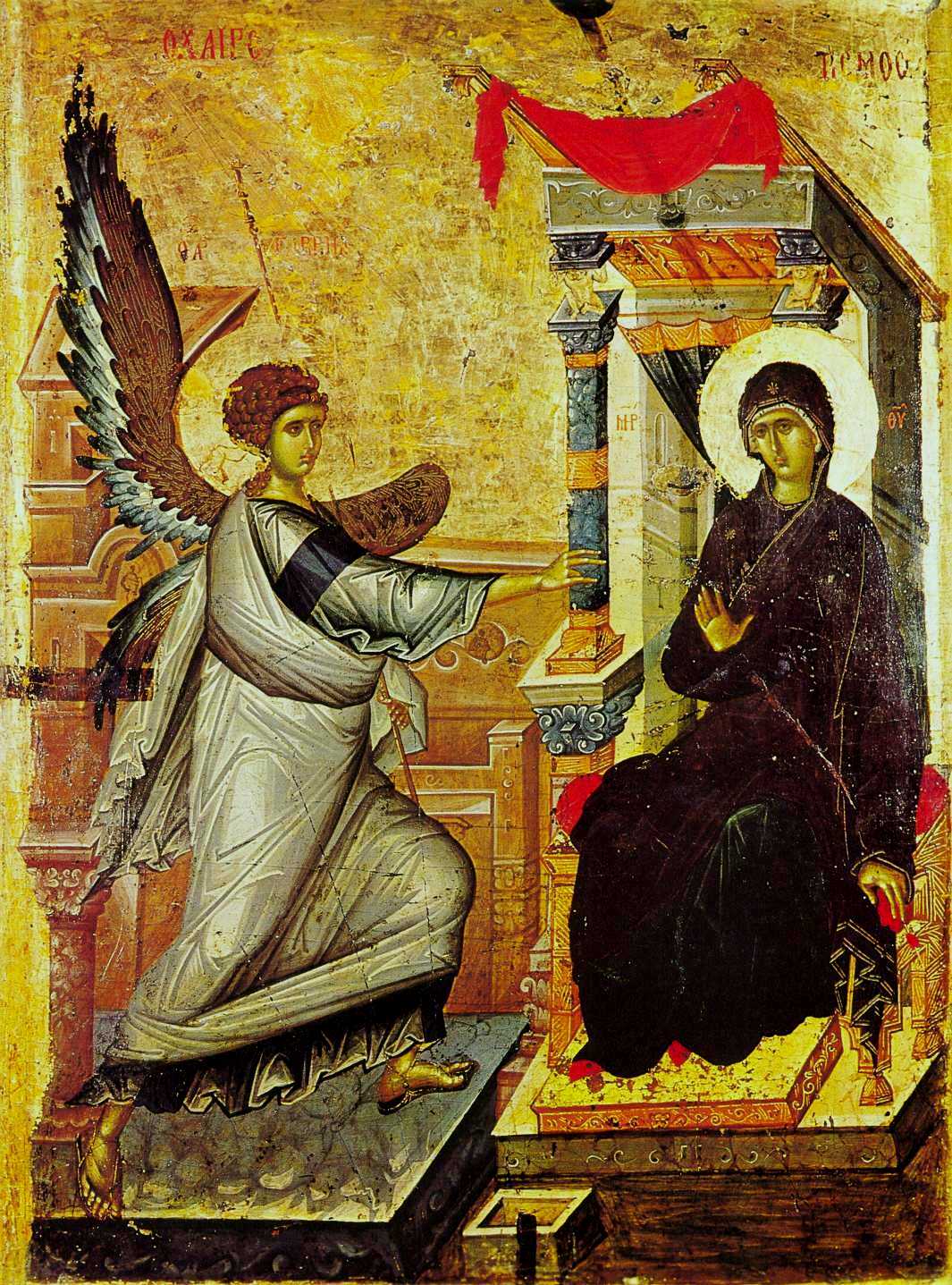 Today the Church celebrates summit of our salvation.
Today the Church celebrates summit of our salvation.
The Annunciation of Gabriel to Mary that she would be the Theotokos almost always falls during the Great Fast. (*) According to the liturgical norms, it is celebrated on whatever day it falls, and the Divine Liturgy is celebrated, even on Good Friday. (**) The meaning of the Annunciation, however, is in conformity with the meaning of the Great Fast. The Great Fast is a journey from the sin of Adam and Eve to the Resurrection of our Lord. It is a passage from human pride to fidelity to God’s plan of salvation. The sin of Eve, which became the fundamental sin of the whole human race was to choose one’s own plan for salvation over God’s. It’s result, though, was death. Jesus in the resurrection, takes the power of death and twists it into life, as St. Paul said, “We were indeed buried with him through baptism into death, so that, just as Christ was raised from the dead by the glory of the Father, we too might live in newness of life” (Romans 6:4).
Jesus was able to do this because he became a human being in the womb of Mary, who replaced Eve’s disobedience with obedience to God, “Behold, I am the handmaid of the Lord. May it be done to me according to your word. (Luke 1:38)” Thus, God “condescended” (that is, he came down to be with us) so that the plan of God could be lifted up. “Though he was in the form of God, [Christ] did not regard equality with God something to be grasped. Rather, he emptied himself, taking the form of a slave, coming in human likeness; and found human in appearance, he humbled himself, becoming obedient to death, even death on a cross” (Philippians 2:6-8). Therefore, the Annunciation is a part of Pascha, as Melito of Sardis explained in his Paschal Homily: “And indeed there were many other things proclaimed by numerous prophets concerning the mystery of the passover, which is Christ, to whom be the glory forever. Amen.”
When this one came from heaven to earth for the sake of the one who suffers, and had clothed himself with that very one through the womb of a virgin, and having come forth as man, he accepted the sufferings of the sufferer through his body which was capable of suffering. And he destroyed those human sufferings by his spirit which was incapable of dying. He killed death which had put man to death” (65-66). We sing, “Today is the summit of our salvation.” (Troparion)
Liturgy of the Pre-sanctified Gifts tonight
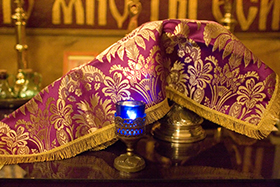 Tonight, March 13th, Father Iura will serve the Divine Liturgy of the Pre-sanctified Gifts at 7:00 p.m.
Tonight, March 13th, Father Iura will serve the Divine Liturgy of the Pre-sanctified Gifts at 7:00 p.m.Recipes for the Great Fast
Here are some recipes for the Great Fast/Lent from the monks of Mount Athos
Let us know how the recipes come out…
Tuesday of the First Week of the Great Fast
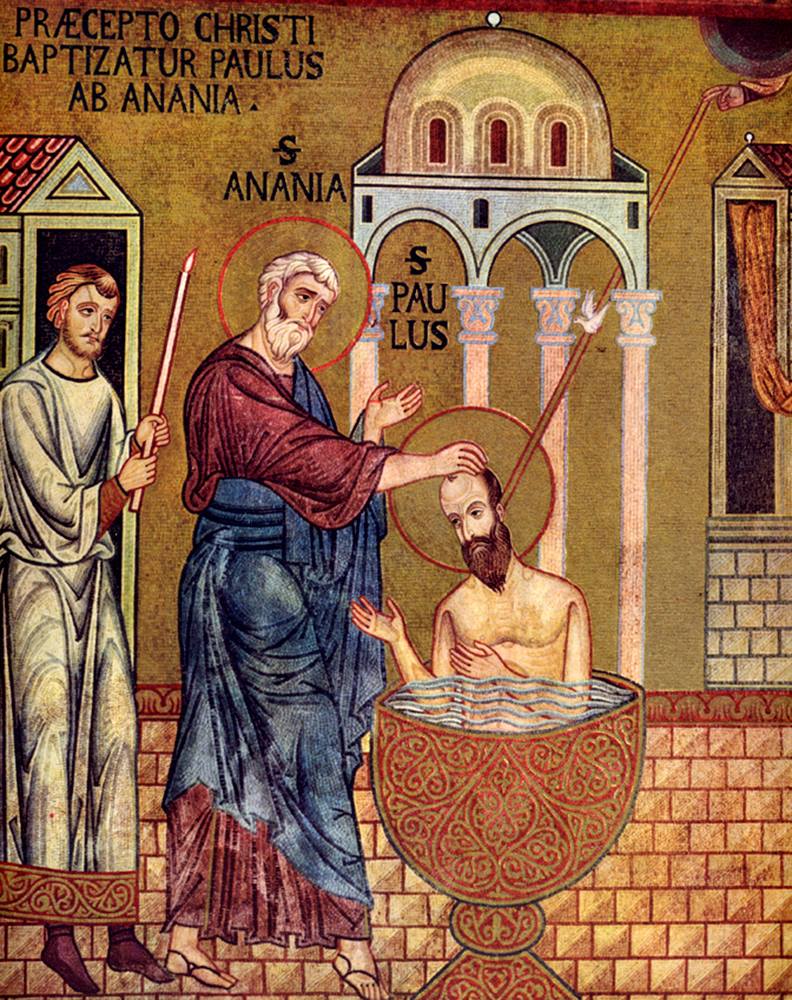 What does it mean to be a Christian, a follower of Christ? The stichera today remind us of our life in Christ in the holy sacramental mysteries. We anoint ourselves, when chrismated with “the seal of the gift of the Holy Spirit,” but this means virtue. We are baptized, washed with the consecrated water, but it is the water of purity. We are partakers of the Lamb of God, we partake of the sacrifice, we partake of the resurrection, but this is “the brightness of virtue and the goodness of our deeds.” Yes! We need to fast, to deny ourselves, but the fasting itself is not the goal, but our transformation by God’s love into a people that is holy and pure and good.
What does it mean to be a Christian, a follower of Christ? The stichera today remind us of our life in Christ in the holy sacramental mysteries. We anoint ourselves, when chrismated with “the seal of the gift of the Holy Spirit,” but this means virtue. We are baptized, washed with the consecrated water, but it is the water of purity. We are partakers of the Lamb of God, we partake of the sacrifice, we partake of the resurrection, but this is “the brightness of virtue and the goodness of our deeds.” Yes! We need to fast, to deny ourselves, but the fasting itself is not the goal, but our transformation by God’s love into a people that is holy and pure and good.
Icon: Baptism of St. Paul
Meditation by Archpriest David Petras
The beginning of the Great Fast (Lent)
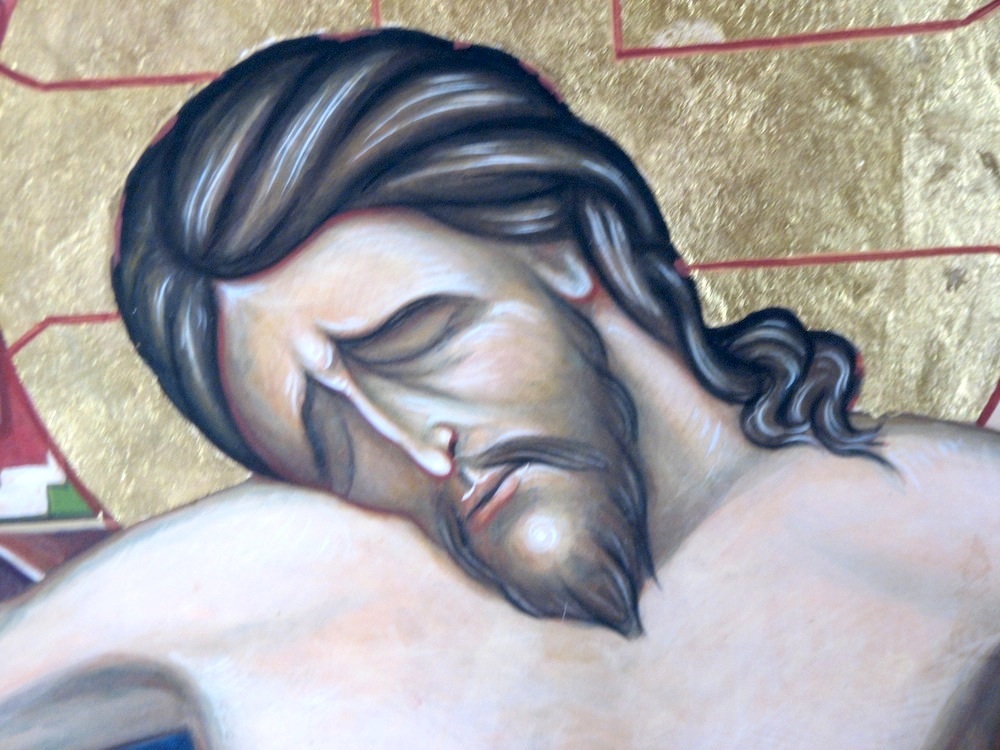 The Church sets aside the next forty days as a period of prayer and penance as a preparation for the Great and Holy Week and the resurrection of our Lord. There are rules about fasting, which we must observe as faithful Christians. However, we must not mistake the true meaning of the Fast. The fast is, truly, a period of spiritual ascesis (struggle), as today’s Gospel tells, us, “Do not store up for yourselves treasures on earth … But store up treasures in heaven” (Matthew 6:19-20). However, it is not like school, where we keep all the class rules and earn gold stars for our obedience. Today’s epistle tells us that the Fast is not about “keeping rules:” “The one who eats must not despise the one who abstains, and the one who abstains must not pass judgment on the one who eats; for God has welcomed him” (Romans 14:3). Yes, we do keep the rules, but we must also transcend the rules.
The Church sets aside the next forty days as a period of prayer and penance as a preparation for the Great and Holy Week and the resurrection of our Lord. There are rules about fasting, which we must observe as faithful Christians. However, we must not mistake the true meaning of the Fast. The fast is, truly, a period of spiritual ascesis (struggle), as today’s Gospel tells, us, “Do not store up for yourselves treasures on earth … But store up treasures in heaven” (Matthew 6:19-20). However, it is not like school, where we keep all the class rules and earn gold stars for our obedience. Today’s epistle tells us that the Fast is not about “keeping rules:” “The one who eats must not despise the one who abstains, and the one who abstains must not pass judgment on the one who eats; for God has welcomed him” (Romans 14:3). Yes, we do keep the rules, but we must also transcend the rules.
The Great Fast is not a period of earning merit points, which leads to pride anyway, but it is a time for a spiritual revolution in our lives. We must turn the values of the world: love for power, love of money, love of pleasure, and self-serving upside down. In our baptism, we promised to renounce “Satan, and all his works, and all his angels and all his service, and all his pride,” and to commit ourselves to Christ. This is especially true in a world which polarizes us into self-righteousness and teaches us hatred for the other. Why, indeed, do we fast? It is to bring about this revolution, foretold by Mary, the Mother of God, “[God] has thrown down the rulers from their thrones but lifted up the lowly. The hungry he has filled with good things; the rich he has sent away empty” Luke 1:52-53).
We must become the humble, the lowly, the hungry and reject the world’s lust for power. In the Great Fast, then, we live out the Lord’s Prayer: “Thy Kingdom come, thy will be done on earth as it is in heaven,” not our own plan for salvation, but God’s plan, God’s will, seen in love for the other, “Give us this day our daily bread,” for we fast from the delightful food of this world, to receive only Christ, who said, “I am the bread of life (John 6:48);” “forgive us our trespasses, as we forgive those who trespass against us,” in unconditional forgiveness, as today’s Gospel reveals, “If you forgive others their transgressions, your heavenly Father will forgive you. But if you do not forgive others, neither will your Father forgive your transgressions (Matthew 6:14-15), and finally, “lead us not into temptation, but deliver us from evil,” for if in the Fast we imitate Jesus, who fasted in the desert for forty days to overcome temptation, then we too will be delivered from evil, but not by our own proud struggles, but by the grace of God. In this fast, we must open ourselves to Christ, who said, “Behold, I make all things new” (Revelation 21:5).
Lenten Regulations 2019
Lenten Regulations 2019 of the Ukrainian Catholic Diocese of Stamford
By the threefold discipline of fasting, prayer and almsgiving the Church keeps the Great Fast/Lent from Monday, March 4 (March 11 – Julian Calendar), after the Cheesefare Sunday to the day before Easter, Holy Saturday, April 20 (April 27 – Julian Calendar).
The following regulations apply, in general, to all Ukrainian Catholics of the Stamford Eparchy between the ages 21-60:
~Abstinence from meat and dairy products on The First Day of the Great Fast, March 4 (March 11), and on Good Friday, April 19 (April 26).
The following regulations apply, in general, to all Ukrainian Catholics of the Stamford Eparchy between the ages 14-60:
~Abstinence from meat is to be observed on all Fridays and the Great Fast.
~Abstinence from meat is suggested and encouraged on all Wednesdays of the Great Fast.
Note: The following are exempt from abstinence: 1. the poor who live on alms; 2. the sick and frail; 3. Convalescents who are returning to their strength; 4. pregnant women and women who are nursing their children; and, 5. persons who perform hard labor.
Meat is to be understood as including not only the flesh, but also those parts of warm-blooded animals that cannot be rendered, i.e., melted down, e.g., the liver, lungs, etc. meat gravy or soup made from meat is included in this prohibition.
Dairy products are to be understood as comprising products derived from mammals and birds, but not regarded as meat, e.g., cheese, lard, butter, milk, eggs, etc.
Eucharistic Fast:
A fast of one hour from food (prior to service starting time) should be kept those receiving the Eucharist at the evening celebration of the Divine Liturgy of the Pre-sanctified Gifts, as well as the Divine Liturgy of St. John Chrysostom and St. Basil the Great.
Wednesday of the Fifth Week
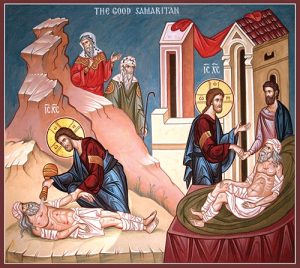 Matins
Matins
O my soul, you have left the heights of virtue and have gone down into the abyss of sin. You have fallen under the blows of the evil robbers, you are covered with wounds; but now cry out to Christ our God, who let himself be wounded and crucified for you: Come to my help, O Savior, and save me.
Wounded by thieves of the soul, how miserable I am! O Lord, I am left half-dead. The rank of prophets passes me by, seeing me close to death, incurable through human knowledge, and in bitter suffering. In the humility of my heart, I cry out to you: O Christ our God most merciful, anoint me with the oil of your mercy.
Vespers
Beaten in spirit and robbed of my mind, I fell among corruptible thieves, who steal away my power to think. My soul has been scourged, and I lie on the path of life stripped of all virtue. A priest sees that I suffer from incurable sores, but passes by without a second glance. A Levite, not wanting to share my deadly pain, looks down on me and also passes by. But you, O Christ our God, though born of Mary and not as a Samaritan, grant me healing because of your love for humankind, and pour out the riches of your mercy upon us.
Reflection
In the fifth week of the Great Fast, we chant the Canon of St. Andrew of Crete. This long poem recounts, though stories from Scripture, the many ways we “have gone down into the abyss of sin.” There is no way to rationalize our sinful ways, so the samohlasens remind that we are “incurable through human knowledge,” that we have been robbed of “our power to think.” We cannot pull ourselves up by our own cleverness and worldly wisdom, but only by the wisdom of God, who is our Lord Jesus Christ. The refrain of all the hymns this week repeat in various expressions: “Come to my help, O Savior, and save me.”
Meditation by Archpriest David Petras